PROFILE - George Washington Leadership Style

George Washington, often revered as the “Father of our Country,” played a crucial role in the founding of the United States.
His father, Augustine Washington, greatly influenced his character, instilling values such as integrity, prudence, and industry. His leadership qualities, such as resilience, integrity, strategic decision-making, and balancing power with humility, shaped the nation’s trajectory and continue to inspire leaders today.
In this exploration of the leadership of George Washington, we will delve into the various aspects of his life and leadership, demonstrating his unwavering commitment to the American cause.
Key Takeaways
- George Washington was a revolutionary leader during the American Revolution, demonstrating his commitment and perseverance at Valley Forge.
- He displayed strong leadership skills in building consensus and setting precedents as President of the United States.
- His dedication to personal integrity, public duty, unity among citizens, strategic decision making and balanced approach to power serve as an example for today's leaders.
The Revolutionary Leader: Washington in the American Revolution
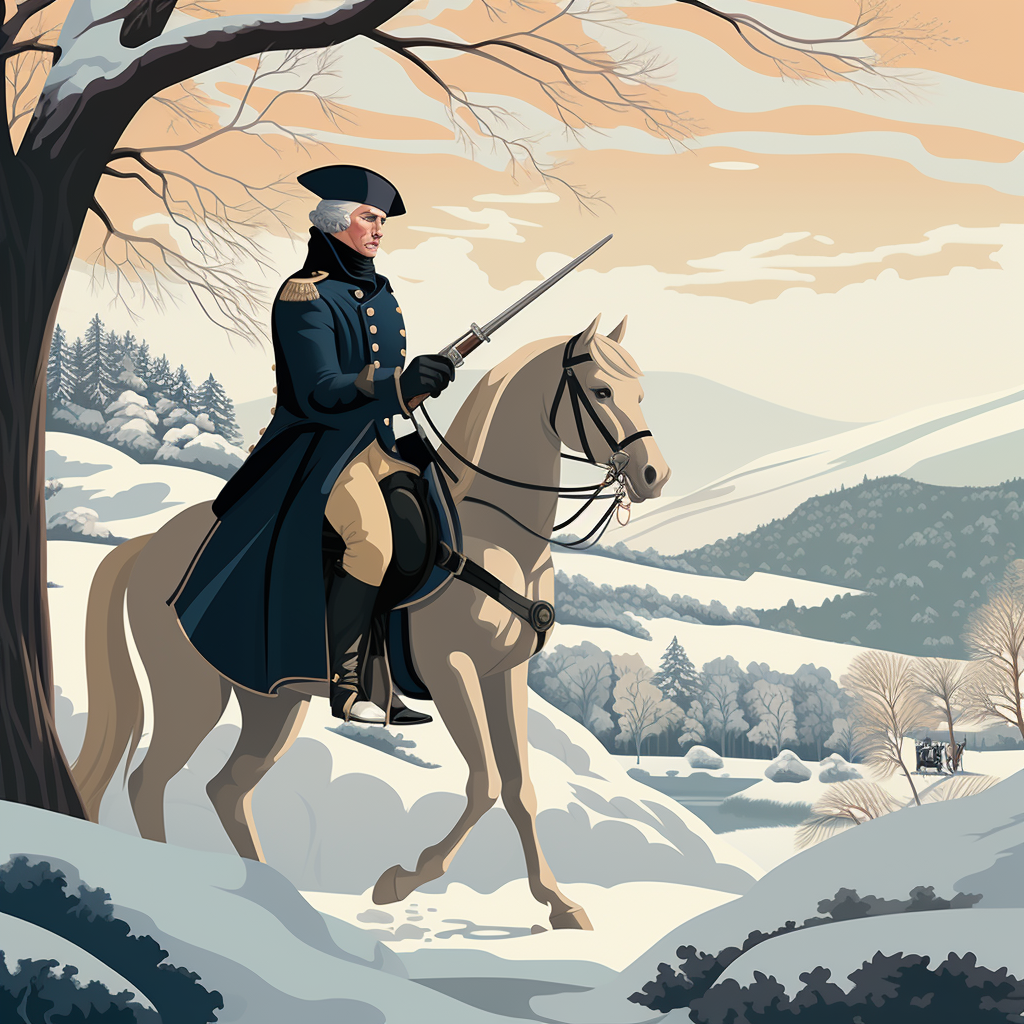
George Washington and the American Revolution
George Washington, also known as General Washington, as the Commander-in-chief of the Continental Army during the Revolutionary War, displayed remarkable resilience, strategic acumen, and the ability to motivate his troops. He was selected as the military leader of the independence movement due to his demonstrated loyalty and competence.
Washington's experiences during the French and Indian War contributed significantly to his leadership qualities, shaping his military skills and character traits at an early age.
Washington led the Continental Army through numerous challenges, including transforming it into a force capable of securing independence for the American colonies and uniting the Confederate colonies as a new nation.
A significant example of Washington’s leadership is evident during the Battle of Monmouth. His leadership qualities include:
- Calm and confident demeanor on the battlefield
- Deterred the troops from retreating
- Inspired them to fight with increased intensity compared to prior engagements
- Strategic decision-making
- Ability to adapt to changing circumstances
These qualities earned him widespread respect as a great leader.
Washington was unanimously elected as the Commander in Chief of the Continental forces due to his esteemed character, extensive military experience, and well-known views on British and colonial relations. His leadership role during the American Revolution set the stage for his future role as the inaugural President of the United States, which solidified his position as a pivotal figure in American history.
Winter at Valley Forge: Perseverance and Commitment in Valley Forge
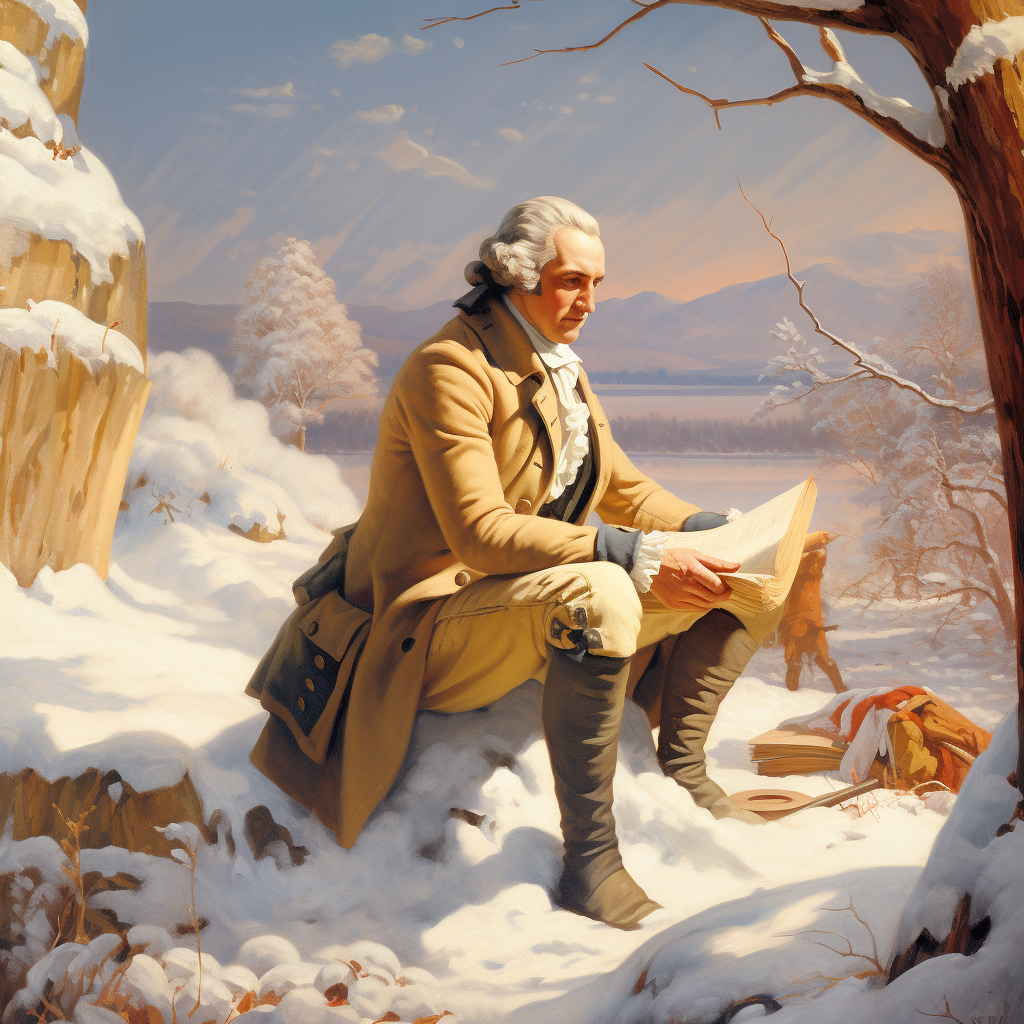
Winter at Valley Forge
George Washington's leadership was significantly defined during the winter at Valley Forge. Amidst harsh conditions, including starvation, cold, disease, and exposure, Washington remained with his troops and shared their hardships. Despite the challenging circumstances leading to the death of over 2,500 soldiers, instances of mutiny remained minimal.
Washington's perseverance and dedication to his soldiers were evident in his tireless efforts to improve the conditions at Valley Forge. He obtained supplies and provisions for his troops and implemented strategies to maintain morale. These measures included exemplifying patience and obedience to motivate his men to persevere through difficult circumstances and securing extended recruitments from the Continental Congress to provide stability and dedication to the cause.
Despite the hardships Washington fought through, his steadfast commitment to American independence and his troops epitomized his leadership skills in adversity and his focus on the ultimate objective - securing freedom for the American people.
The Constitutional Convention: Building Consensus
George Washington, a key figure at the Constitutional Convention, exhibited his knack for consensus-building and moderation. He was unanimously elected to preside over the Convention due to his esteemed reputation, adoration from the populace, and his admirable character and capacity to reconcile disparate perspectives.
Washington had a precise, judicious, and remarkably consistent perception of what he desired an American republic to become.
During the Convention, Washington realized the importance of playing a pivotal role in molding the foundational principles of the United States. He understood that compromise was essential for the success of the new nation.
By accommodating differing opinions and fostering a spirit of cooperation, Washington helped to establish a strong and unified government that would serve the American people for generations to come. George Washington discerned his identity and character in American terms, methodically studying political systems and world affairs to shape his leadership during this critical period.
His leadership at the Constitutional Convention:
- Demonstrated his ability to build consensus among the delegates
- Laid the groundwork for his presidency
- Had a lasting influence on the development of the United States.
Setting Presidential Precedents
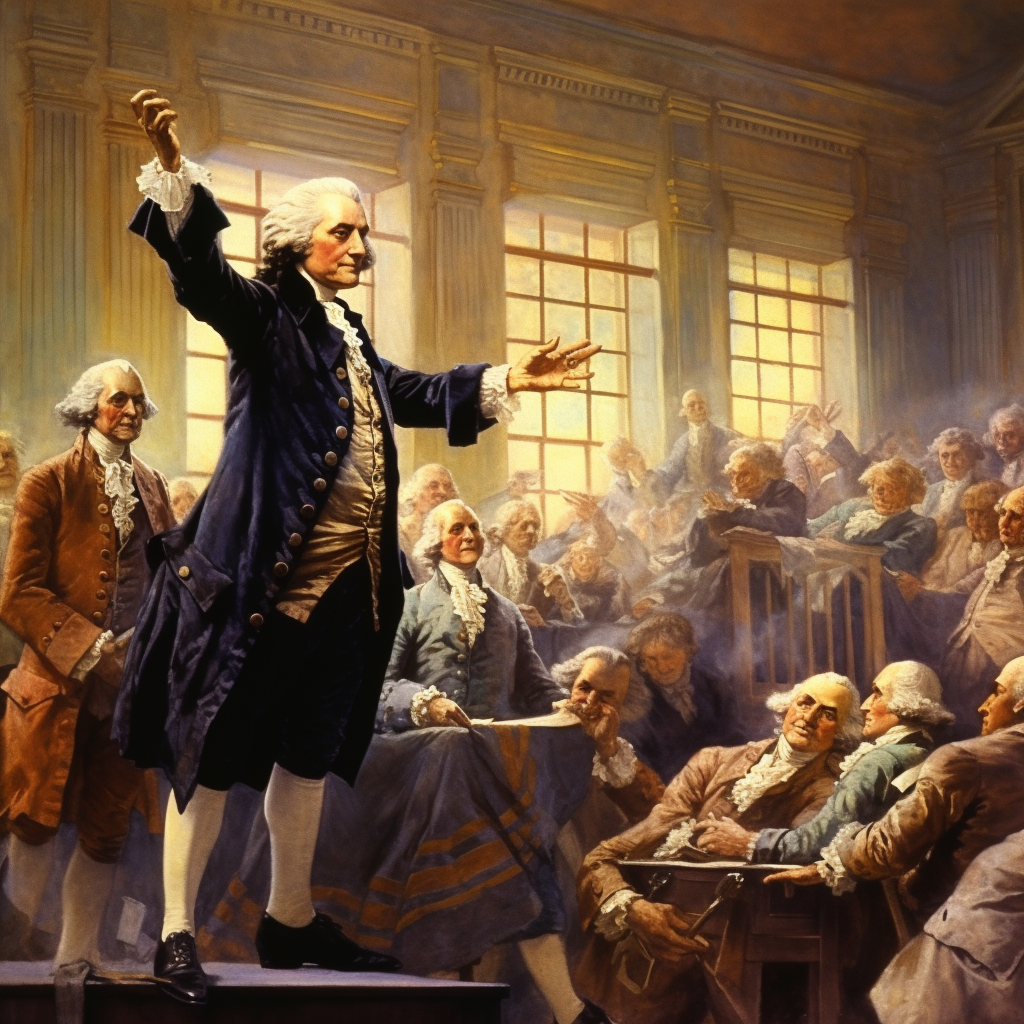
Setting Presidential Precedents
Washington’s approach to his presidential role was characterized by a deep understanding of the importance of establishing precedents for the office. As the first President of the United States, he understood that his actions would have a long-lasting impact on the nation’s future leaders and the stability of the federal government.
George Washington's personal and physical characteristics made him the obvious choice to take charge as the first president, given his reputation as a national hero and the respect he garnered from his peers.
One of Washington’s most significant contributions as president was the establishment of a cabinet to advise him on matters of state.
This decision, which can be referred to as “Washington established,” helped to create a more efficient and organized executive branch, ensuring that the President would have access to a diverse range of perspectives and expertise when making critical decisions. Additionally, Washington’s voluntary relinquishing of power after two terms in office set a precedent for future presidents, demonstrating a commitment to democratic principles and the peaceful transfer of power.
Another significant aspect of Washington’s presidency was his emphasis on economic stability. He implemented policies to create a unified financial system across the nation, such as the central government assuming state debt. This approach laid the foundation for a strong and prosperous nation that could withstand the challenges of the future.
Balancing Law and Restraint: The Whiskey Rebellion
The way Washington handled the Whiskey Rebellion exemplified his skill in balancing law enforcement with discretion, thus ensuring the nation's stability. The Whiskey Rebellion was a 1794 uprising of farmers and distillers in western Pennsylvania in opposition to a whiskey tax imposed by the government. The rebellion transpired due to the farmers and distillers feeling that the tax was unjust and oppressive.
In response to the Whiskey Rebellion, Washington took the following actions:
- Assembled a militia of 13,000 troops
- Personally led them into western Pennsylvania to quell the rebellion
- Issued a proclamation demanding that the rebels disperse and return to their residences
- Demonstrated restraint by initially attempting to prosecute the resistors through the judicial system rather than utilizing military force.
The way George Washington managed the Whiskey Rebellion revealed the strength of the new federal government, its ability to enforce laws, and its contribution to the nation's stability. His approach to this crisis highlighted his commitment to upholding the rule of law while also striving for peaceful solutions to conflict.
Farewell Address: Wisdom for Future Generations
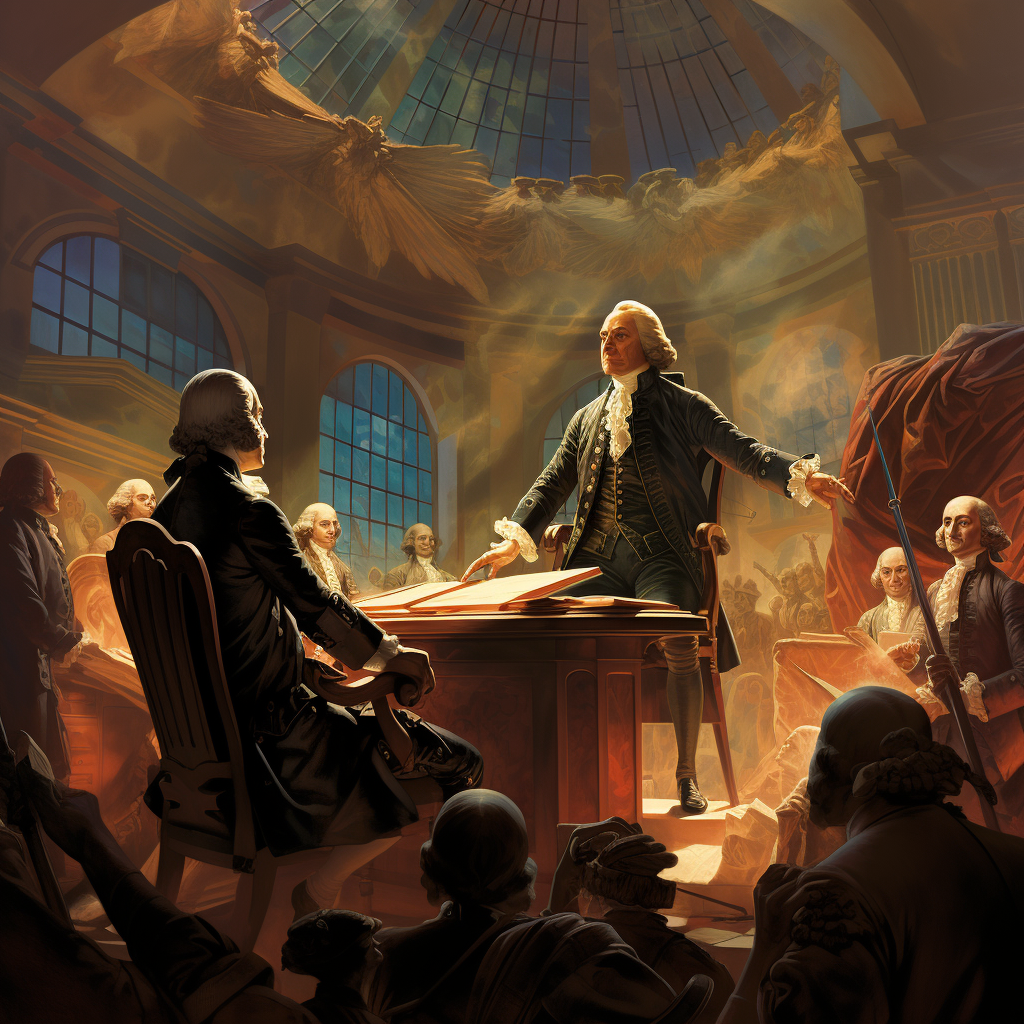
Farewell Address
In his Farewell Address, Washington offered timeless advice, including:
- Against forming permanent alliances
- Emphasizing the importance of national unity
- Indicating his intention not to seek a third term in office
- Providing a cautionary reminder of the risks of political factions and the significance of unity.
In his Farewell Address, Washington shared several important pieces of advice. He cautioned against forming permanent alliances with foreign nations, underscoring the necessity of remaining neutral in international affairs. Additionally, he highlighted the potential risks of political parties and urged harmony among the American people. Washington's focus on upholding the principles of justice and good faith in all dealings served as a reminder of the values that should guide the nation's leaders.
The wisdom imparted in Washington's Farewell Address continues to resonate with leaders today, as its timeless advice serves as a reminder of the importance of prioritizing the nation's interests and fostering unity among its citizens.
Neutrality Amidst European Conflicts
During his presidency, Washington's neutral stance amidst European conflicts manifested his dedication to safeguarding the interests of the fledgling nation and promoting its growth. He believed that it was in the best interest of the United States to maintain its autonomy and abstain from involvement in foreign disputes.
To solidify this position, Washington issued the Proclamation of Neutrality in 1793, declaring the United States' neutrality in the conflict between Britain and France. This policy allowed the nation to focus on its own development and growth, without becoming embroiled in the disputes of European powers.
Washington's stance of neutrality during European conflicts highlights his dedication to prioritizing the interests of the United States and ensuring its continued growth and development.
Personal Integrity and Public Duty
Throughout his public service career, George Washington exhibited a strong dedication to personal integrity and public duty. He firmly believed in placing the interests of the nation above any personal conflicts of interest and prioritized serving the public over his own interests.
George Washington's relationship with his father significantly influenced his character. The early death of George Washington's father led him to shape his identity in 'American' terms, creating a unique public persona within America.
An example of Washington’s commitment to circumventing conflicts of interest was his emphasis on unity and his pursuit of diverse perspectives. He requested the opinions of others, even if they opposed his own views, and made decisions based on thorough deliberation. This approach allowed him to maintain a balanced perspective and focus on the greater good of the nation.
Washington’s commitment to personal integrity and public duty serves as an example for leaders today, reminding them of the importance of prioritizing the well-being of their constituents and avoiding conflicts of interest in their decision-making.
Handling Criticism and Opposition
George Washington's strategy for dealing with criticism and political opposition demonstrated his ability to keep the greater good in focus and maintain a balanced viewpoint. As the first president, he faced substantial criticism and political opposition from various factions. Washington's strategies for managing political opposition included advocating for unity, seeking varied opinions, and prioritizing the interests of the nation. His focus on the greater good allowed him to weather the challenges of his presidency and remain dedicated to the vision of a unified and prosperous nation.
Washington's unwavering commitment to his policies and his prioritization of national interests over political and regional issues showcased Washington's leadership in challenging times and stay focused on the ultimate goal of freedom and prosperity for the American people.
Lessons in Leadership: Key Qualities of George Washington
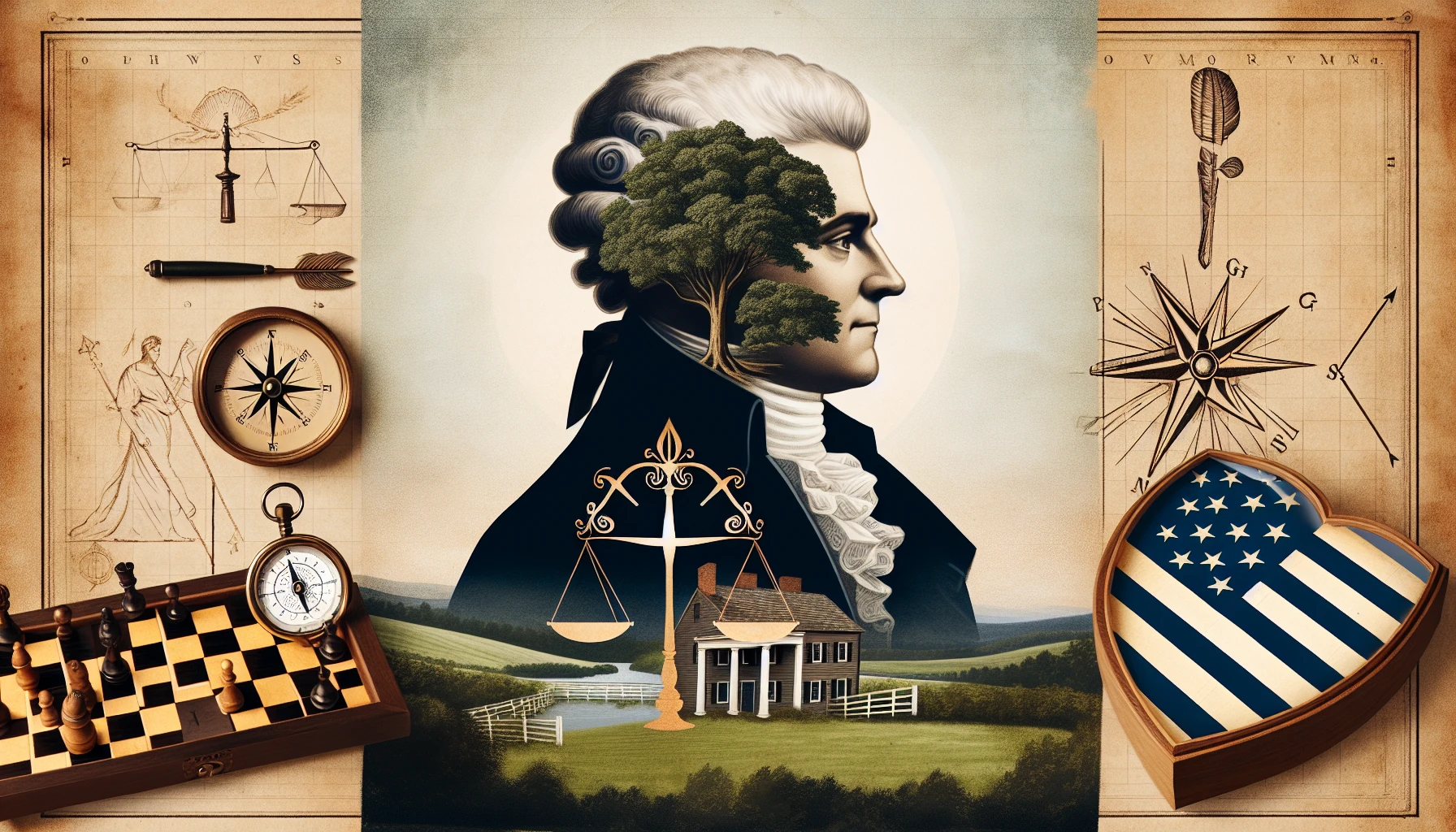
Leaders today can glean valuable lessons from the leadership qualities of George Washington, which encompass:
- Resilience
- Integrity
- Strategic decision-making
- The ability to balance power with humility
George Washington's character traits, such as his sense of duty, physical prowess, punctuality, kindness, thoughtfulness, modesty, taste for literature, diplomacy, and leadership qualities, were shaped by his upbringing, military education, and experiences.
His unwavering commitment to the American cause, demonstrated through pivotal events such as the American Revolution and the winter at Valley Forge, serves as a shining example of perseverance and dedication to the people’s welfare.
Washington’s ability to manage criticism and political opposition highlights the importance of maintaining focus on the greater good and adopting a balanced perspective in the face of adversity. His commitment to personal integrity and public duty serves as a reminder of the importance of prioritizing the well-being of one’s constituents and avoiding conflicts of interest in decision-making.
George Washington’s exceptional character and unwavering dedication to the United States continue to serve as an inspiration and guide for future generations. George Washington wrote with an unwavering commitment to the cause of American independence and the well-being of its citizens, serving as a testament to the enduring power of strong and principled leadership.
Summary
In examining the life and leadership of George Washington, we have explored his many qualities that contributed to his success as a military commander, statesman, and the first President of the United States. His resilience, integrity, strategic decision-making, and ability to balance power with humility continue to inspire leaders today.
Washington believed in the United States and had a clear vision of what it could become, combining his ideals with a grounded approach to bring them into fruition.
From his leadership during the American Revolution and the winter at Valley Forge to his role in the Constitutional Convention and handling of the Whiskey Rebellion, Washington’s unwavering commitment to the cause of American independence and the well-being of its citizens serves as a testament to the enduring power of strong and principled leadership.
As we reflect on the life and legacy of George Washington, let us remember the timeless wisdom and guidance he offered in his Farewell Address and emulate his dedication to the greater good, personal integrity, and public duty.
Frequently Asked Questions
What are some things George Washington did as president?
During his Presidency, George Washington signed the Judiciary Act of 1789, proposed the first national bank, and created the cabinet system. He also negotiated the Jay Treaty and the Treaty of Greenville, which settled land disputes between Native Americans and settlers.
What was George Washington's greatest achievement as president?
George Washington is widely regarded as one of the founding fathers of the United States and his greatest achievement as President was establishing a strong, unified government that respected the rule of law. He also ensured a peaceful transition of power after two successful terms, setting the standard for all subsequent American presidents.
What made George Washington the best leader?
George Washington was an exemplary leader, possessing visionary leadership, maintaining coherence between his ideas and actions, and understanding the importance of making the Constitution work for democracy to take root in America. His heroic character and decisions made him a true role model and America’s best leader.
Washington strategically hid his ambitions and methodically studied political systems, world affairs, and competitive intelligence to appear disinterested, which exemplified the perfect balance of moderation and detachment admired by later leaders during tumultuous times.
How did George Washington handle criticism and political opposition during his presidency?
George Washington sought to preserve national unity while handling criticism and opposition, displaying a steadfast commitment to his policies and prioritizing the interests of the nation.
What role did George Washington play in the Constitutional Convention?
George Washington played a pivotal role in the Constitutional Convention, serving as its president and exhibiting his proficiency in compromise and diplomacy.



